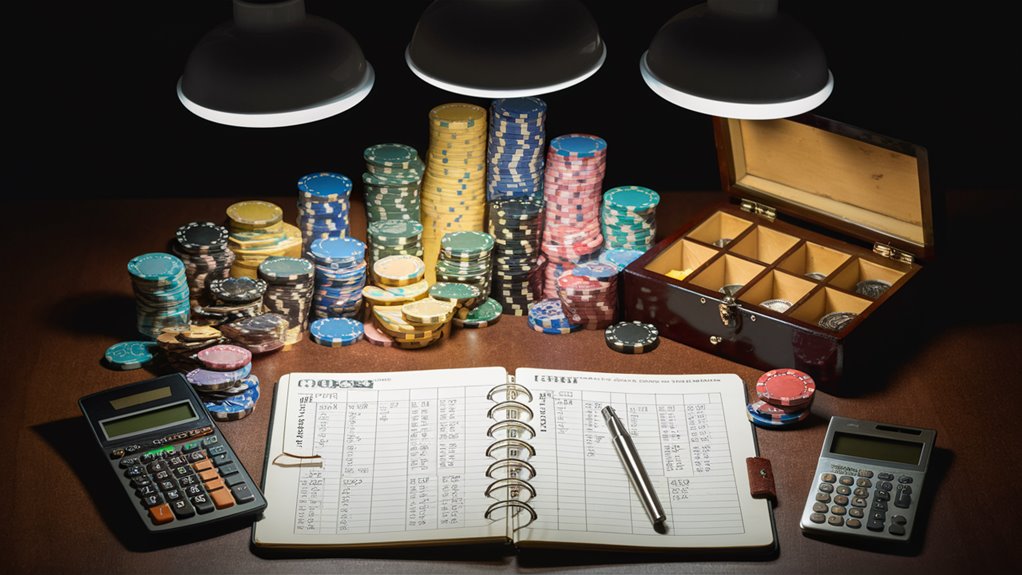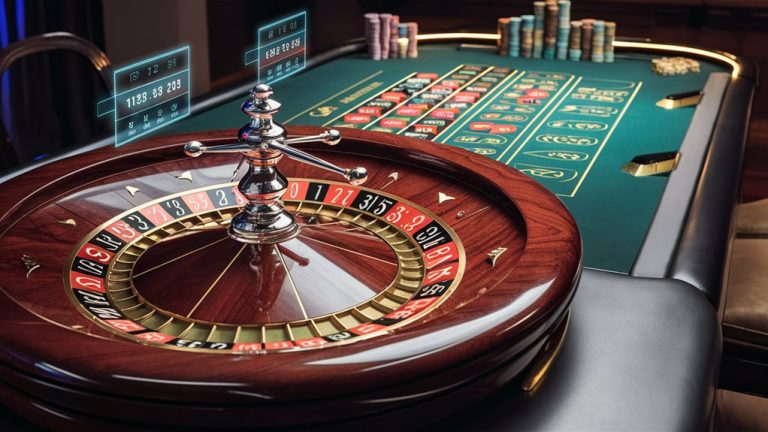
Key Poker Tips You Need

How to Play Your Spot
Playing your spot is key to good poker. Going last lets you know more than others. Play safe from early spots and open up when you’re last. Get how spot roles work to make top choices often.
Smart Money Rules
Use strict money rules to keep your cash safe. Have 20-30 buy-ins for table games and don’t risk over 5% of your money in one go. This plan keeps your play strong for a long time and covers for ups and downs.
Math Skills: Pot Odds and Rates
Figuring pot odds right helps you win. For pot odds, split the call cost by the total pot. To fast-check how you might do, times your outs by 4 after the flop. Know these numbers to make smart bets.
Know How Others Play
Get good at seeing body clues and bet styles. Watch for: Visit Website
- How they breathe
- Hand moves
- How they bet
- Timing changes
- How they handle chips
Use Table Roles
Picking your table and knowing its flow helps you win. Spot easy targets, fit your play to the vibe, and watch chip stacks. Use what you know about others while hiding your play style.
Choosing Cards Smart
Pick starting hands based on:
- Your spot at the table
- Chip amounts
- How others play
- Table mood
- Place in the game
These simple truths guide good poker play if used all the time.
Playing Your Spot Well
Play Your Spot Like a Pro: A Big Game Plan
The Power of Your Spot
Your spot at the table is often more key than your cards. Timing your bets as the last player lets you make money.
Being last lets you watch others call, raise, or fold before you act, giving you a big edge in picking cards and betting.
Smart Card Picking by Spot
Early spot play means you bet safe with fewer cards since going first has risks. This saves you from hard choices after the flop.
On the other hand, later spots like the button let you bet on so-so cards, using the spot edge all through the game.
Betting Smart by Your Spot
Bet sizes should change with your spot.
Out-of-spot bets are often big to stop others from staying in with bad cards.
When in spot, use small, sure bets to keep pot control, using what you know by the end. Winning by playing your spot needs you to change how you bet to use the spot’s power or cut its risks.
Deep Spot Tricks
Great spot play is more than where you sit. It’s about playing based on spot against others, eyeing stack sizes, how they play, and the set cards.
This way of using spots opens ways to make money in different games and bets.
Seeing Poker Clues
Spotting Poker Clues: A Full Guide
Main Thoughts on Tells
Finding poker tells uses three big ideas: same moves, setting, and proof.
A true tell shows up often, making a pattern.
Each tell must be checked in the right setting of the hand, player styles, and table feel.
Body Signs
Usual body signs are key in finding tells. Main spots to watch include:
- Shakes or hand moves
- Breathing changes
- Betting ways
- Neck pulse
- Chip ways
- How they sit
Body moves often tell more real stuff than face looks, which good players can fake.
Subtle acts are key when the betting gets big.
How They Talk
Speech clues give hints on hand strength. Listen for:
- How they sound
- How fast they answer
- Extra talking
- More or less chat
- Change from normal acts
Good tell reading needs seeing sets of the same signs before making big bets on these reads.
Money Rules Must-Knows
Key Money Steps for Poker Players

Get Your Poker Money Basics Right
A poker fund is the base rock of all good poker careers.
Right money steps shape long wins and playing life in the game.
Must-have Money Steps
Rules for Table Games
- Keep 20-30 buy-ins for where you play most
- For example, at $1/$2 stakes ($200 max buy-in), you need $4,000-$6,000
- Never risk over 5% of all your money in one go
Steps for Tournaments
- Store 50-100 buy-ins due to bigger ups and downs
- Manage stakes by checking your total money
- Drop stakes if you go below what you need
Better Money Moves
Track It All
- Note each play session well
- Watch wins, losses, and where your bankroll goes
- Check how you play to find weak spots
- Use deep data to pick stakes wisely
Keep Money Apart
- Keep game cash away from personal money
- Have a poker-only account
- See your poker fund as work money
- Base choices on data, not just feelings
Handle Risks
- Stick to money rules well
- Change stakes by your bankroll size
- Set stop-loss limits
- Stack smart
Doing Pot Math
Top Skills in Pot Math for Poker
Pot Math Basics
Pot odds are key math ideas that set apart top players.
To figure them, split the calling cost by the full pot size after you call. For a $20 call into a $100 pot, the odds are 6-to-1 ($120/$20).
Work Out Drawing Odds
Chances to get better cards must line up with pot odds for best bets.
With a flush chance with nine outs after the flop, times the outs by four to set river bettering chances (36%). This translates to about 2-to-1 against odds. When pot odds beat these draw odds, calling is smart by the math.
Deep Pot Math
While simple pot odds build a base for smart bets, top players also factor in possibly better odds and possibly worse odds.
This broad look is extra useful in set bet games, where fixed bet setups let for more sure math.
Get these math bases to keep making money choices across all kinds of games and times.
Bluff Plans That Work
Top Bluff Moves in Poker
Smart Bluff Timing and Spot
Spot edge matters a lot when you want to bluff well. Going last gives the most info and hand control.
How others see your play needs thought – keep a good image by choosing when to bluff and by solid past bet patterns.
Right Bet Size Moves
Steady bet sizes hide your aims. Keeping bets in line with pot size makes a balanced bet pattern that hides plans.
Don’t fall into too big bluffs, they often show not strength but weakness.
Check Board Set-up and Others
Board checks help show a believable hand story. Use boards that hint at straight chances and flush chances to make others believe you.
Pick on players who fold a lot and dodge those who stick around. Have back-up plans for draws to keep some value if you end up called.
Deep Bluff Plans
Work out bluff paths over different plays. Think how your bluff tale goes over flop, turn, and river.
Keep balanced hands of real bets and bluffs to stop others from using you. Focus on where others are weak or can’t take heat.
Key Signs of Winning
- Spots good for bluffing
- Steady betting ways
- Using board set-ups
- Picking the right targets
- Plans for when you’re called
Mind Games for Winning
Mind Tricks for Poker Wins
Keep Cool Under Stress
Mind strength and calm under stress set great players apart.
Being OK no matter what helps, where results don’t mess with how well you decide.
Staying steady, even after big losses, ties to long poker wins.
Mind Tools to Use
How to Apply Them
- Set clear stop-loss before playing
- Take deep breaths between hands
- Keep a detailed play log
- Use the 5-5-5 rule: five deep breaths, five-second pause, five focus points
Handle Mind Traps
Usual mind blocks need early handling:
- Plan breaks to fight tiredness
- Check how sure you feel with real self-looks
- Stop revenge plays by sticking to rules
- Keep the same prep before games
- Check how you feel often
Build Up Mind Power
Treat your mind game like a muscle that needs regular work.
Often using mind control ways makes your mind endurance better.
Keep how you act at the table the same to hide tells, no matter the hand result.
Build set responses to hard spots over just reacting.
Grow Your Mind Game
- Watch your feelings with detailed play checks
- Use clear after-bad-game steps
- Try seeing plays in your head for best choices
- Make ready-for-anything mind plans
- Set up your own tilt-stop systems
- Las Vegas Nightlife Inside Casinos, Clubs, DJs and VIP Experiences



